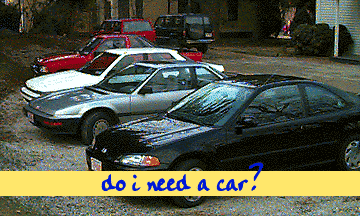
Tripod Home
| New
| TriTeca
| Work/Money
| Politics/Community
| Living/Travel
| Planet T
| Daily Scoop
 Do you really need a car?
Do you really need a car?
For obvious reasons, this is probably the most important question you will face in the car-buying process. Here are some ways to think about the whether or not you need a car:
Opportunity Cost: Consider the other ways you could spend the, say, $15,000 you might spend on a new car.
Spread out over five years, that's the difference between a $400/month apartment and a $650/month apartment. Or it could even be the downpayment on a mortgage, if you're thinking about buying a house.
You could buy one thousand compact discs, or three thousand good blank tapes to copy up all those bootlegs.
You could buy a wardrobe of 30 low-end Italian suits. Or five mid-range Italian suits. Or one really nice one.
Or, quite seriously, you could put the money into a mutual fund. At a growth rate of 9 percent, with all your profits reinvested, after five years your $15,000 will become more than $23,000. That's more than a 50 percent profit.
Of course, in order to think like that you have to make a few assumptions ...
1) You're probably not going to pay the $15k up front. So you wouldn't get to buy one thousand compact discs right away. It would be more like joining the Columbia House Record Club, and paying for whatever they send you every month.
2) You could exercise any of those other options, but then you wouldn't have a car. If you need a car, for work or whatever other reason, you don't have the luxury of exercising other options. Often, though, I find that people don't absolutely need a car. In those situations, having a car is simply very useful and very desirable. The alternatives are not unthinkable. They're just very inconvenient and undesirable.
Here are some reasons you might need a car:
- To get to and from work or school, if there are no reasonable public transportation options.
- If you need a car to actually do your job (for site work, etc.)
- If you have frequent commitments, to business or family, that require significant road travel.
- If you have children who need trucking around.
Here are some alternatives to buying a car:
- Use public transportation. In large cities like New York or Boston, it is entirely feasible to do all your travel by subway, bus, and taxi. Even if you occasionally rent a car, you would still likely save money. In suburbs or spread-out cities like Los Angeles, this plan just wouldn't work.
- Get to work by sharing a ride. If getting to work is your main concern, maybe hitching a ride with a co-worker is an option. Offer to split the gas or pay a fixed fee for a regular ride.
- Think about your feet. If you live in a small town, it's entirely reasonable to hoof it much of the time. Combine an aggressive commitment to walking with some public transportation and you may have saved yourself the price of a car.
Here are some good reasons to want a car, even if you don't need a car:
- A car can give you an unequaled amount of freedom. No waiting for rides or late buses, or for the rain to subside so that you can walk. You can go where you want, when you want.
- A car can give you a lot of aesthetic pleasure. Think about Sunday drives, late-night cruises, and spontaneous road trips. They just don't work on a bike.
- A car encourages you to travel and explore, things that can be difficult without your own wheels. If you live in New York, you don't need to think twice about spending the weekend with your friend in Philly.
One last thing to consider: The nice thing about buying a car (or anything, for that matter), is that if you decide not to buy one this week, you can always change your mind and buy one next week. On the other hand, have you ever bought a car and then, having changed your mind, tried to return it to the dealer the next week? Chances are your money is already in a secure account somewhere in the Swiss Alps. And it don't have a round-trip ticket either. (Plus, the value of your new car will depreciate by between10 and 20 percent the minute you drive it away from the dealer.)
The point is: you don't need to think about a car as a yes or no proposition. If you think you might want a car, think about the possibility of waiting a year. What would be the inconvenience of not having a car this next year? What would be the advantage of holding on to your money for another year? You might be making more money then, or have a better job, or one that doesn't require a car. You might also be unemployed and destitute. Then it might be handy to have a car, if only to sleep in.
It's not a simple decision. But as long as you've thought it through, go with your intuition. It may seem foolish, but take a second to answer the first two questions on your worksheet:
- Do I really need a car?
- Is now the right time to buy a car?
If you can stare these questions in the face and boldly check yes with indelible ink (or at least a fickle mouse-click), then you've probably got the right stuff.

Tripod Home
| New
| TriTeca
| Work/Money
| Politics/Community
| Living/Travel
| Planet T
| Daily Scoop
Map
| Search
| Help
| Send Us Comments


